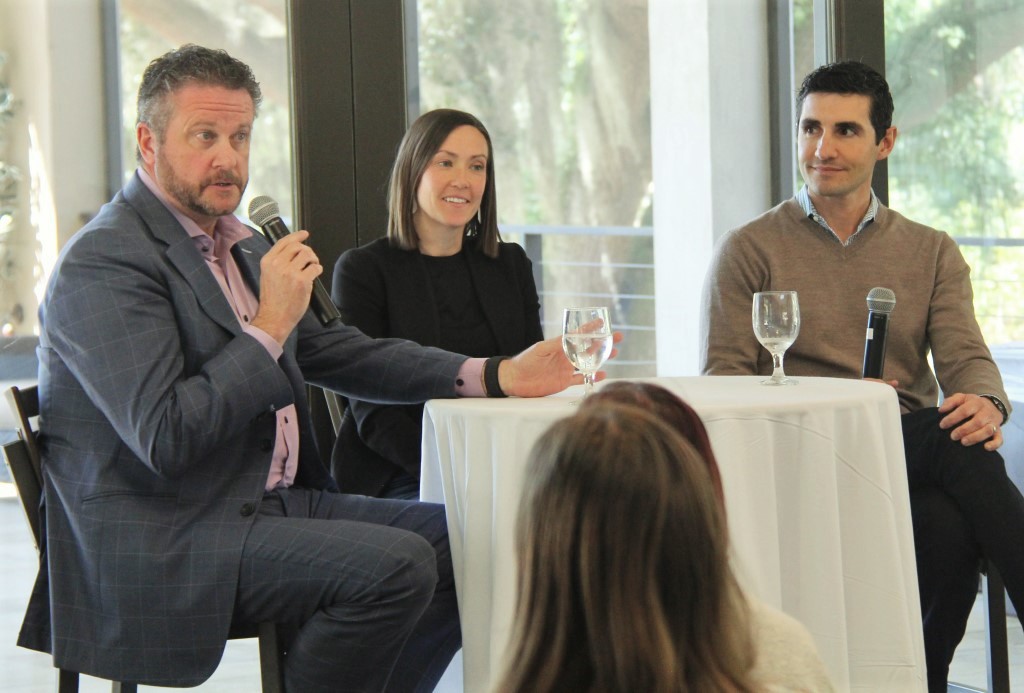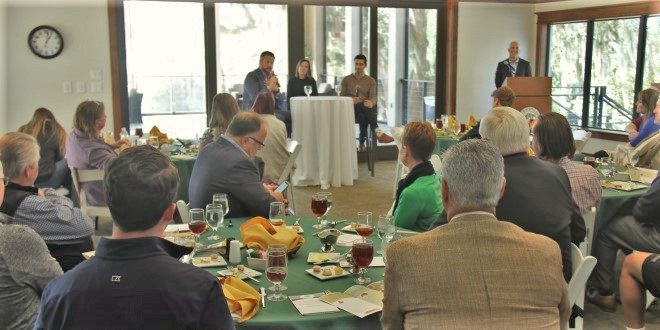Technology can bring revolutionary change to industry – often in unexpected ways.
Raised customer expectations, for instance.
“Customer expectations are only going to get more intense,” Matt Gutermuth, executive vice president and chief operating officer of food service technology provider iControl Data Solutions, told an audience at the “Adapting to the Changing Retail and Restaurant Landscape” panel discussion last week at The River House. “Technology will serve those who figure out how to leverage it for a better, easier customer experience.”
Gutermuth joined Northeastern Florida food industry veterans Sara Frasca, owner of Trasca and Co. Eatery, and Josh Martino, president of Bono’s Pit Bar-B-Q and Willie Jewell’s Old School Bar-B-Q, to discuss technology’s impact on food service at the Davis College of Business (DCOB) Consumer Goods and Service Marketing luncheon. The event was moderated by DCOB Executive in Residence Jack Parker.

Gutermuth directed his comments squarely at restaurant takeout and retail food sales and delivery technology. Martino aimed his more specifically at review and recommendation websites, such as Yelp. He said that because such websites offer consumers the ability to immediately vent their frustration, they often turn small annoyances into major criticisms. For example, he said, restaurants sometimes serve cold food or an incorrect meal choice. Those errors are quickly fixed when a customer is served at a table in a restaurant. They are much harder and take longer to correct when food is delivered by a third-party vendor.
“The criticisms are often merciless,” Martino said. “If I can get a customer with a complaint on the phone after they’ve had a chance to think about things, their response is usually quite different.
“Technology is creating a false sense of reality.”
The reality is that technology has and will continue to change the industry, Frasca said.
“In the past five years, delivery services have become a major component of our industry,” Frasca said. “People want convenience, things like rapid to-go meals they can take away.”
All three industry veterans said that many restaurants and retailers are experiencing sales growth but not necessarily increased profits. New sales coming through channels like delivery services and website sales have business owners fundamentally rethinking basic operating procedures such as pricing, staffing, and facility size and layout.
“Technology is the biggest threat the food and beverage industry has ever faced,” Gutermuth said. “There is a lot of money wasted based on old ideas.”
So those businesses that learn to integrate and leverage technology will emerge more profitable and stronger than they are today, the panelists said.
“Most consumers, particularly in retail, are looking for an idea or inspiration to create a meal,” Gutermutch said. “If an online vendor can put together an entire solution to help a consumer figure out what they want, that merchant will succeed in the digital age.”
But in the end, the industry will still fulfill its basic mission: service.
“Great food, great service, a great experience,” Frasca said. “That’s what we’re trying to do.”
 Wave Magazine Online Jacksonville University News Hub
Wave Magazine Online Jacksonville University News Hub
